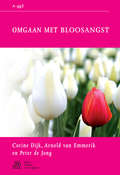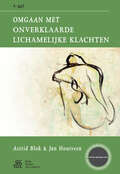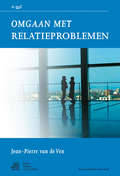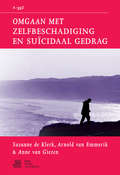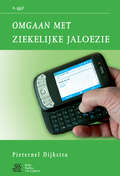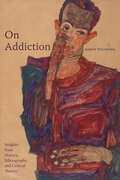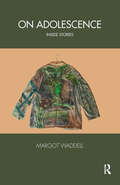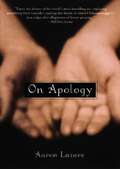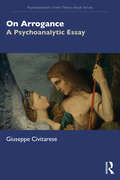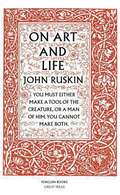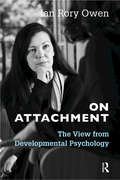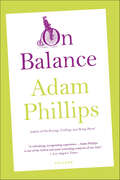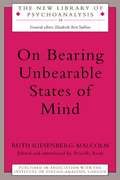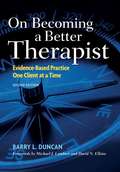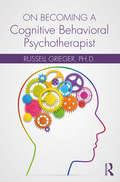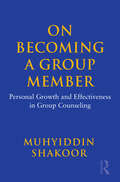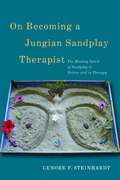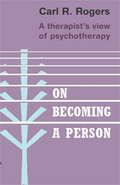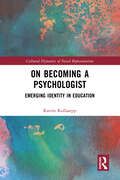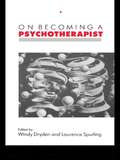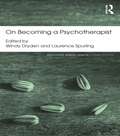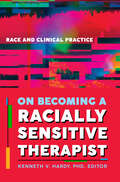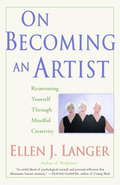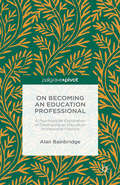- Table View
- List View
Omgaan met bloosangst
by Peter De Jong A.A.P. Emmerik vanBeschrijft wat bloosangst is en wat het verschil met blozen is, hoe dit ontstaat, en welke behandelingen er zijn. In de reeks A-ggZ.
Omgaan met onverklaarde lichamelijke klachten
by A. Blok J. HoutveenInformatief boek voor mensen met onverklaarde lichamelijke klachten.
Omgaan met relatieproblemen
by Jean-Pierre van VenBeschrijft de mogelijkheden en vaardigheden om inzicht in je eigen relatie te krijgen. Met talrijke voorbeelden van gesprekken en therapiesessies uit de praktijk.
Omgaan met zelfbeschadiging en suïcidaal gedrag
by Arnold Emmerik Suzanne Klerk Anne GiezenVerschijnt in de reeks A-ggZ. Bevat vele direct toepasbare adviezen. Bedoeld voor zowel de professionals als voor de cliënt om meer inzicht te krijgen in zijn of haar stoornis. In dit boek worden zelfbeschadiging en suïcide behandeld.
Omgaan met ziekelijke jaloezie
by Pieternel DijkstraZelfhulpboek. Geeft inzicht in de oorzaken, gevolgen en behandelmogelijkheden van ziekelijke jaloezie. Wat betekent ziekelijke jaloezie voor de relatie tussen jou en je partner? Wat is de rol van het uiterlijk en het zelfbeeld bij jaloezie? Wat is de beste behandeling? Gelukkig is er ook veel dat je zelf kunt doen om van je jaloerse gevoelens af te komen. Ook op deze zelfhulptechnieken gaat het boek in. Verschijnt in de reeks A-ggZ, 2e, geheel herziene druk.
On Addiction: Insights from History, Ethnography, and Critical Theory
by Darin WeinbergMainstream addiction science sees addiction either as a biomedical disease that renders one incapable of self-control or as a voluntary practice engaged in freely. In On Addiction, Darin Weinberg shows how this dynamic is deeply influenced by a series of binaries (free will/determinism, mind/body, objectivity/subjectivity) that hinder our understanding of addiction. Here, he offers a new theorization of addiction in which he breaks down these contradictions and incompatibilities, calling into question the taken-for-granted distinction between the “biological” and the “social.” To the extent that it is understood as a loss of self-control over one’s behavior, addiction, Weinberg contends, requires a supple theoretical framework that provides for movements into and out of self-control, for the social and natural processes that influence these movements, for the historical contexts within which they occur, and for the ethical ramifications of taking them seriously. To create this framework, Weinberg brings together history, ethnography, and critical theory as well as the clinical and social sciences. In this way, Weinberg takes a more holistic approach to examining the fundamental nature and ethics of addiction.
On Adolescence (Tavistock Clinic Series)
by Margot WaddellAdolescence and adolescent states of mind have seldom captured so much attention publicly, nor have they stirred so much anxiety and disturbance privately. This long acknowledged, problematic, transitional world between childhood and adulthood is especially fraught, these days, with the assaults and pressures of contemporary culture and modern technology. The heart of the book lies in the exploration of the inner lives of these young people, whether or not they find their way to clinical services. It sets out to illuminate the sorts of things that go wrong, and how we can help to address them – the crises of identity, gender, loss, self-harm, bullying, depression, anger, suicidal impulses, anxiety, and so much more. On Adolescence: Inside Stories is intended for all those concerned with adolescence, and adolescent states of mind at whatever age or stage.
On Apology
by Aaron LazareOne of the most profound interactions that can occur between people, apologies have the power to heal humiliations, free the mind from deep-seated guilt, remove the desire for vengeance, and ultimately restore broken relationships. With On Apology, Aaron Lazare offers an eye-opening analysisof this vital interaction, illuminating an often hidden corner of the human heart. He discusses the importance of shame, guilt, and humiliation, the initial reluctance to apologize, the simplicity of the act of apologizing, the spontaneous generosity and forgiveness on the part of the offended, the transfer of power and respect between two parties, and much more. Readers will notonly find a wealth of insight that they can apply to their own lives, but also a deeper understanding of national and international conflicts and how we might resolve them. The act of apologizing is quite simply immensely fulfilling. On Apology opens a window onto this common occurrence to reveal the feelings and actions at the heart of this profound interaction.
On Arrogance: A Psychoanalytic Essay (Psychoanalytic Field Theory Book Series)
by Giuseppe CivitareseThis book explores the notion of arrogance from a broadly psychoanalytic perspective, and examines its importance in the consulting room and the wider world.Starting from the writings of Freud and Bion, Civitarese explores how much our inner and outer worlds may be shaped by arrogance, both our own and that of others. The author proposes that much of psychological suffering can be explained by non-recognition, of our own needs and desires, or those of others. It can be argued that arrogance is a symptom of lack of mutual recognition and in itself a significant obstacle to psychic growth. This book is an interdisciplinary dialogue between psychoanalysis, literature, and philosophy, which offers a non-reductive view of arrogance to make visible the psychological suffering it conceals.With a broad psychoanalytic basis, On Arrogance will be essential reading for psychoanalysts, psychotherapists, scholars in humanities and anyone wishing to broaden their understanding of arrogance in clinical work and beyond.
On Art and Life
by John RuskinThroughout history, some books have changed the world. They have transformed the way we see ourselves - and each other. They have inspired debate, dissent, war and revolution. They have enlightened, outraged, provoked and comforted. They have enriched lives - and destroyed them. Now Penguin brings you the works of the great thinkers, pioneers, radicals and visionaries whose ideas shook civilization, and helped make us who we are.
On Attachment: The View from Developmental Psychology
by Ian Rory OwenAttachment theory occupies an integrative position between psychodynamic therapy and various perspectives within empirical psychology. Since therapy began, its way of thinking has been to interpret mental processes in relation to meaningful psychological objects between children and parents, partners, friends, and within individual therapy. This volume summarises the research literature relating to attachment theory in developmental psychology in order to clarify conclusions that support practice. Part 1 considers the received wisdom about attachment, and summarises the literature and what it means for understanding relationships and defences as part of development. Part 2 considers attachment in relation to emotional regulations, while part 3 applies the clarified understanding of attachment processes to inform assessment and therapy, and more broadly, mental health work in general. The ideas of Sigmund Freud and John Bowlby are used to reinvigorate psychodynamic practice.
On Balance
by Adam Phillips"Balancing acts," writes Adam Phillips, "are entertaining because they are risky, but there are situations in which it is more dangerous to keep your balance than to lose it." In these exhilarating and casually brilliant essays, the philosopher and psychoanalyst examines literature, fairy tales, works of art, and case studies to reveal the paradoxes inherent in our appetites and fears. How do we know when enough is enough? Are there times when too much is just right? Why is Cinderella's biggest problem not the prince but other women? What can Richard III's furious sense of his own helplessness tell us of our own desires? On Balance shows Phillips's bravura gift for linking disparate ideas and the dreamers that dreamed them into something beautiful, revelatory, and essential.
On Bearing Unbearable States of Mind (The New Library of Psychoanalysis #Vol. 34)
by Ruth Riesenberg-MalcolmThis is a problem almost all practising psychoanalysts will face at some time in their career, yet there is very little in the existing literature which offers guidance in this important area. On Bearing Unbearable States of Mind provides clear guidance on how the analyst can encourage the patient to communicate the quality of their often intolerably painful states of mind, and how he/she can interpret these states, using them as a basis for insight and psychic change in the patient. Employing extensive and detailed clinical examples, and addressing important areas of Kleinian theory, the author examines the problems that underlie severe pathology, and shows how meaningful analytic work can take place, even with very disturbed patients. On Bearing Unbearable States of Mind will be a useful and practical guide for psychoanalysts and psychotherapists, and all those working in psychological settings with severely disturbed patients.
On Becoming a Better Therapist: Evidence-Based Practice One Client at a Time
by Barry L. DuncanHow can therapists become better at doing what they love, avoid burnout, and prevent client dropout? Respected therapist, trainer, and researcher Barry Duncan asserts that getting better at this work requires therapists to dedicate themselves to two key tasks: obtaining systematic client feedback and taking charge of their own development as a therapist. <P><P>This book describes his Partners for Change Outcome Management System (PCOMS), an evidence-based method that provides systematic feedback from clients, thereby enabling therapists to identify and target clients who aren't responding to traditional treatment before they drop out. Duncan examines the common factors inherent to all successful therapies and details the importance of the therapeutic alliance as the foundation of effective therapy. He encourages therapists to expand their theoretical breadth, think deeply about the lessons they learn from their clients, and integrate these lessons into their performance. His highly readable book details a five-step plan to take charge of personal and professional development, stave off disenchantment, and remain a vital force for change in clients lives.
On Becoming a Cognitive Behavioral Psychotherapist
by Russell GriegerCognitive behavioral psychotherapy is much more than a series of skills and techniques, but rather a vital human activity. It starts with the inner being of the therapist, that is, his or her personality and character, and then moves to the outer world of strategies and tactics. Drawing on a wealth of personal and professional experience, Dr. Russell Grieger illuminates ten inner perspectives that transform a technician into a psychotherapist, including the fundamental nature of being human, the power of passionate purpose, fearlessness, the pursuit of elegance, ridding self-esteem, and more. For the practicing clinician, the therapist in training, and the interested layperson, this book should be in everyone's library.
On Becoming a Group Member: Personal Growth and Effectiveness in Group Counseling
by Muhyiddin ShakoorThis book provides an introduction to the general landscape of group counseling by way of the idea that learning to be an effective group member is essential to becoming a group leader. Interactive scenarios place the reader right into the group, providing insights into the challenges and opportunities of participation. Each chapter explores a different stage of group work and concludes with useful suggestions and tips for having a successful experience. Throughout the book, an emphasis is placed on member development and personal growth being achieved through self-awareness, interpersonal experiences, and dynamic ways of being. Cultural diversity, ethics and confidentiality, and involvement strategies and skills are also discussed. With its unique, practical, and engaging approach, this book will be invaluable to counseling students as an excellent complement to the theory and research on group counseling.
On Becoming a Jungian Sandplay Therapist: The Healing Spirit of Sandplay in Nature and in Therapy
by Lenore SteinhardtOn Becoming a Jungian Sandplay Therapist discusses the deep inner process of entering the sandplay profession and addresses important creative aspects of understanding and practising sandplay. It describes the current theory behind the approach and the roles of the therapist and the client, as well as exploring the healing potential of nature and the numinous in art and sandplay. It provides a detailed case study outlining the ten year sandplay process of an Israeli woman of North African origin, whose fear was transformed by creativity and emotional support. Later chapters look at symbols as containers of power, and discuss the use of individual sandplay in group sessions. Offering a unique creative and spiritual perspective of Jungian sandplay, this book will be an insightful resource for both novice and experienced sandplay therapists, as well as other therapists interested in sandplay training.
On Becoming a Person
by Carl R. RogersSeveral articles with introductions written in the fifties for psych professionals, their clients and the general public.
On Becoming a Person: Person-centered Teaching, Psychology, Philosophy, And Dialogues With Carl R. Rogers And Harold Lyon
by Carl RogersIn this book, one of America's most distinguished psychologists describes his experiences in helping people to discover the path to personal growth through an understanding of their own limitations and potential. What is personal growth? Under what conditions is it possible? How can one person help another? What is creativity, and how can it be fostered? These are some of the issues raised, which challenge many concepts of traditional psychology.Contemporary psychology derives largely from the experimental laboratory, or from Freudian theory. It is preoccupied with minute aspects of animal and human behaviour, or with the mentally ill. But there are rebels, of whom the author counts himself as one, along with Gordon Allport, Abraham Maslow and Rollo May, who feel that psychology and psychiatry should be aiming higher, and be more concerned with growth and potentiality in man. The interest of such a psychology is in the production of harmoniously mature individuals, given that we all have qualities and possibilities infinitely capable of development. Successful development makes us more flexible in relationships, more creative, and less open to suggestion and control.This book, philosophical and provocative, summarizes Dr Rogers' experience. Non-technical in its language, it is not only for psychologists and psychiatrists, but for teachers and counsellors, religious and social workers, labour-management specialists and anyone interested in 'becoming'.
On Becoming a Psychologist: Emerging identity in education (Cultural Dynamics of Social Representation)
by Katrin KullaseppOn Becoming a Psychologist explores the professional identity construction of psychology students, examining their entry into the psychology profession from a socio-cultural perspective. The book brings together socio-cultural approaches and Dialogical Self Theory to gain comprehensive insight into the developmental processes behind the formation of professional identity. It conceptualises the process of becoming a psychologist as an intrapersonally and interpersonally unique semiotic process of self-regulation that unfolds through dialogical relations with the individual’s socio-cultural surroundings. Building on empirical research, the book outlines the results of a longitudinal study of a cohort of psychology students throughout their studies and following their graduation. The study sheds light on how professional role expectations are negotiated between the different aspects of the self, with a particular focus on how the self is positioned throughout the course of professional education. Offering a unique perspective on the socio-cultural construction of professional identity, this book will be of great interest to scholars, researchers and graduate students in the fields of cultural psychology, applied psychology and social psychology.
On Becoming a Psychotherapist (Routledge Mental Health Classic Editions Ser.)
by Windy Dryden Laurence SpurlingWhy do people want to become a psychotherapist? How do they translate this desire into reality? On Becoming a Psychotherapist explores these and related questions. Ten leading therapists write about their profession and their careers, examining how and why they became pyschotherapists. The contributors, representing a wide cross-section of their profession, come from both Britian and America, from different theoretical backgrounds, and are at different stages in their careers. They write in a personal and revealing way about their childhoods, families, colleagues, and training. This absorbing and fascinating book offers a fresh perspective on psychotherapy and the people attracted to it.
On Becoming a Psychotherapist (Routledge Mental Health Classic Editions)
by Windy Dryden Laurence SpurlingWhy do people want to become a psychotherapist? How do they translate this desire into reality? On Becoming a Psychotherapist explores these and related questions. Ten leading therapists write about their profession and their careers, examining how and why they became psychotherapists. The contributors, representing a wide cross-section of their profession, come from both Britain and America, from different theoretical backgrounds, and are at different stages in their careers. They write in a personal and revealing way about their childhoods, families, colleagues, and training. This absorbing and fascinating book offers a fresh perspective on psychotherapy and the people attracted to it. This Classic Edition of the book includes a new introduction written by the authors and will be invaluable for qualified psychotherapists and those in training.
On Becoming a Racially Sensitive Therapist: Race and Clinical Practice
by Kenneth V. HardyTransform your clinical practice by transforming yourself Claims of color blindness and the insistence that all clients are essentially the same have contributed to a dearth of knowledge and understanding regarding the delivery of racially sensitive treatment. For many clinicians, addressing issues of race in therapy mirrors the same discomfort that permeates most of our efforts to discuss it outside of treatment. Yet providing racially sensitive therapy, as well as possessing the clinical acumen to address complex issues of race and culture, is vital to competent contemporary practice. The volume is organized into three fundamental sections with contributions from mental health experts who have done the work to unlearn systemic biases about race and therapy. The first section introduces the concept of a racially sensitive therapist and what it means to become one. The second section focuses on cultural and racial storytelling to help uncover unknown parts of oneself and emphasizes racial self-examination, self-interrogation, and personal transformation. And the final section transports the reader from seeing and being to doing with racially informed intervention methods. A monumental undertaking, this book is an essential step for healers and caregivers to reframe the therapy process for all clients. Contributors include: Lane Arye, Vanessa Bing, Toby Bobes, Bonnie Cushing, Elana Katz, Niketa Kumar, Sharon RC Lee, Gloria Lopez-Henriquez, Yasmeen Rubidge, and Virginia Seewaldt.
On Becoming an Artist
by Ellen J. Langer“All it takes to become an artist is to start doing art. ” –fromOn Becoming an Artist On Becoming an Artistis loaded with good news. Backed by her landmark scientific work on mindfulness and artistic nature, bestselling author and Harvard psychologist Ellen J. Langer shows us that creativity is not a rare gift that only some special few are born with, but rather an integral part of everyone’s makeup. All of us can express our creative impulses– authentically and uniquely–and, in the process, enrich our lives. Why then do so many of us merely dream ofsomedaypainting, someday writing, someday making music? Why do we think the same old thoughts, harbor the same old prejudices, stay stuck in the same old mud? Who taught us to think “inside the box”? No one is more qualified to answer these questions than Dr. Langer, who has explored their every facet for years. She describes dozens of fascinating experiments–her own and those of her colleagues–that are designed to study mindfulness and its relation to human creativity, and she shares the profound implications of the results–for our well-being, health, and happiness. Langer reveals myriad insights, among them: We think we should already know what only firsthand experience can teach us. . . . In learning the ways that all roses are alike, we risk becoming blind to their differences. . . . If we are mindfully creative, the circumstances of the moment will tell us what to do. . . . Those of us who are less evaluatively inclined experience less guilt, less regret, less blame, and tend to like ourselves more. . . . Uncertainty gives us the freedom to discover meaning. . . . Finally, what we think we’re sure of may not even exist. With the skill of a gifted logician, Langer demonstrates exactly how we undervalue ourselves and undermine our creativity. By example, she persuades us to have faith in our creative works, not because someone else approves of them but because they’re a true expression of ourselves. Her high-spirited, challenging book sparkles with wit and intelligence and inspires in us an infectious enthusiasm for our creations, our world, and ourselves. It can be of lifelong value to everyone who reads it. From the Hardcover edition.
On Becoming an Education Professional: A Psychosocial Exploration Of Developing An Educational Professional Practice
by Alan BainbridgeThis book draws together a variety of detailed case studies to demonstrate the unique interaction between the past and the present which occurs within the professional education context. Using a psychosocial approach, Alan Bainbridge suggests that this process of identity or role formation requires the expectations and fantasies of the past to be negotiated at the unconscious, individual and social level. A focus on personal agency and dealing with the complexity inherent in education settings highlights the macro and micro negotiations new education professionals are required to undertake between the margins of the personal and professional to provide a more nuanced model for early professional development.
